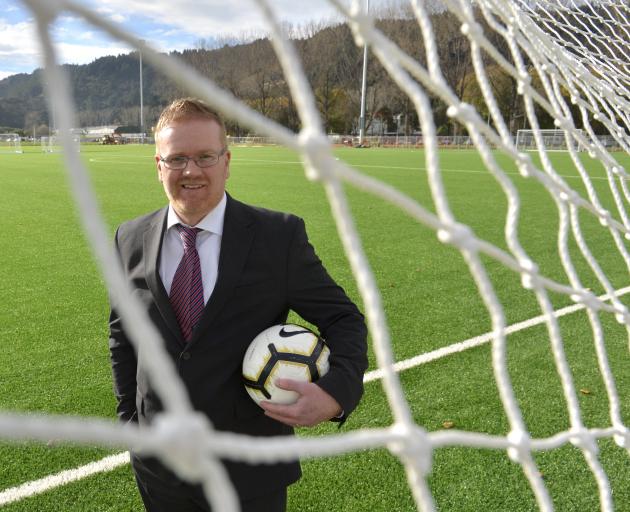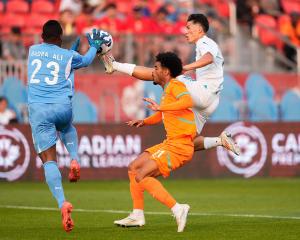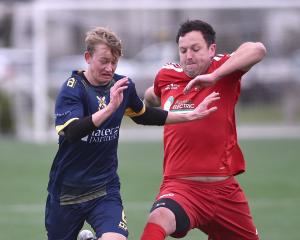
You can never get away from football.
Matthew Holdridge, the departing chairman of Football South, thought after stepping down he would be able now to have a quiet weekend off.
Unfortunately for his wife, Sharon, Holdridge, a lifelong Liverpool fan, chose the exact wrong weekend to head away for some quiet time.
"I had it planned to get away but then Liverpool went and scored four goals against Barcelona and there we go. So I had to talk to my wife and how I have to watch it. But she was completely understanding and said `I am sure we can accommodate it'," he said.
Holdridge said football was part of every weekend in his household - his three children all play the game - and into his work with the board.
It might be attending a meeting, watching a game, getting along to support a Southern United team or coaching a side, which he still does.
The 44-year-old, who was born in England but has been in New Zealand for about 20 years, first became involved with the board through his job as commercial manager at Allied Press.
"It was known as Soccer South back then and I was working with them as part of their community engagement plan. Wilson James was the general manager and we talked and he said you might have the skill set we are looking for to come on the board.
"So in early 2008 I got involved and had just followed Dougal McGowan on the board. It was a new challenge for us."
Back then Soccer South was a smaller operation than it is now. It had a turnover of about $350,000 with about 400 players.
Now it has an operation of about $1.5 million and 9500 football players and slightly more futsal players.
"Playing numbers have really grown a lot, obviously, and that creates challenges and opportunities. With the higher budget that brought more staff."
He said the game was continuing to grow and draw in people from all walks of life.
"It is a global game and the way our population has changed with lots of people coming from around the world - that is going to make it more popular. Then you had the All Whites' success in 2010 and that attracted people."
He said the whole of football plan introduced by New Zealand Football was also a big success. It was a plan to provide children with a fun and rewarding experience at every stage of a player's development.
"All the federations delivered the same format and backed by Sport New Zealand, it really helped the game. So you used to have 9-year-olds playing 11-a-side games on a big pitch which did not suit anyone. There were a lot of training methods - how to deliver really positive training. It has been a massive driver of growth."
The game was easy to play and the risk of injury was less than rugby.
Female football had grown and switching the top league to Saturday had raised its profile.
After a few years on the board, Holdridge took over as chairman in 2014 with the city due to host games for the Under-20 World Cup the following year.
"There was a lot of investment in the tournament with the city. I came in as chair and we needed $175,000 pretty quickly. But thanks to great support from the community we managed to get what we needed."
From the World Cup, the artificial turf project started getting momentum and a feasibility study started the wheels turning.
Last month, the $4 million turf opened at Logan Park and Holdridge said it was an amazing asset for the sport and the city as a whole.
Being chairman meant having more to do and working with chief executive Chris Wright and his staff more. It was about acting as one as a board and having a good mix of skills on the board - about providing the strategy and framework for the sport to thrive.
"But we have to remember it is still just a game and people just want to play the game. Sometimes, though, you have to take risks and do something different."
Holdridge said there were always issues within the sport.
The cost to pay the game was not bad, he said.
"When I first started we did not raise our fees for five to six years and then the whole of football plan came along and we had to put resources into that. There was more money required from the bottom up. But it has gone from less than a cup of coffee a week to maybe one and a-half cups a week, so it is all relative."
Fees rose last year as part of a levy to contribute to the running of Southern United. Football South took over the running of the club three years ago and it has drained resources. It had cash reserves of $220,000 but that had now sunk to just over $50,000.
Holdridge felt the team had fulfilled its goal of providing a pathway to players but whether it could still afford to run the team was the question.
"We have to have controls in place to make it sustainable and live within our means. That pathway is important but we have to come up with a model where we don't lose money with it."
A review of the national league was under way by New Zealand Football while Football South was looking at how it could make Southern United work financially.
Holdridge, who is being replaced by Graham Marshall as chairman, will be an interested spectator at Southern United games although tomorrow morning all eyes will be on the box. So a score?
"I think we're going to win it. I'll go 4-2. It should be a decent game with lots of goals."









